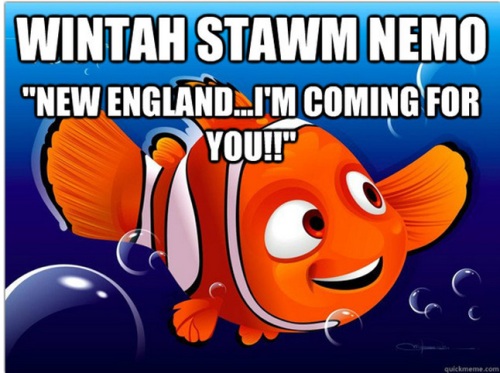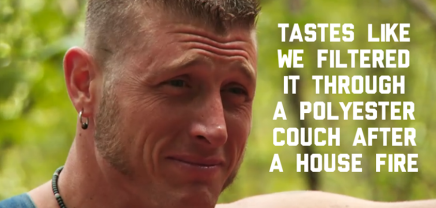
—
Greetings from “Nemo England” or the “NemoEast” or whatever clever name we are branding this winter blizzard!
At last measurement, we had over 2 feet of accumulation in the Boston area, depending on snowdrift. New Englanders are a hearty and resourceful folk, and we are experts at preparing and planning ahead.
Also another first I’ve seen: an executive order that bans driving during the storm in order to keep the roads for plows and other essential workers.
During this snow-in, I’ve caught up on two reality TV shows that I like: Moonshiners and Wicked Tuna.
The reality of my reality TV fandom
I enjoy certain reality shows that are based on small business and industries (or at least help them); shows such as Ax Men, Restaurant Stakeout with the brilliant Willie Degal, the recently-ended American Chopper, and my favorite: Deadliest Catch.

I like Wicked Tuna, not just because I greatly enjoy fishing and tuna melts, but also for the hometown New England-ness of the captains and other characters on the show. Hard working, wise cracking, and just plain tough men and women who are combining their passions with knowledge and unending drive to create their own livelihoods. I support that and I love watching it in action, too.
National Geographic also tries to educate on the science and sustainability behind bluefin tunafishing, and population levels of the fish are monitored via quotas in order to ensure a sustainable population. Sounds logical, right? Well, there’s always two sides to the argument.
Here’s an interesting article from DeepSeaNews.com that argues that the show “will drive up consumer demand, leading to even more overfishing and driving the bluefin closer to functional extinction.”
I think that’s a valid point, however, first I want to take a step back. On the surface, the point of the show (and other similar reality shows about work) is first to ENTERTAIN by showing (sometimes via “creative” editing, scripting, etc.) the perils, triumphs, defeats, and culture of commercial tunafishing.
However, NatGeo also provides a lot of information on the science and sustainability behind the bluefish tuna species, and how the laws and regulations are affecting the industry. The materials urge the need for the two sides, science and the tuna industry, to work closely to find a resolution that is a win-win for both parties. The sustainability of the species also powers industries, creates jobs, feeds families, and provides multiple revenue streams for people willing to work hard and take chances.

Living a life on one’s own terms while also staying in regulation with local state and federal laws is also a major theme on Moonshiners. These ‘shiners are basically self-taught engineers creating artisan level spirits. Their levels of knowledge and experience on creating whiskey is admirable and a testament to their drive and resourcefulness to create their own lives on their terms (illegally, since the booze is not regulated or taxed).
A lot of the show is devoted to the design and implementation of the intricate and hidden distilleries in the rural South and Midwest. They also show the side of law enforcement and their pursuit of the shiners. However, the show also follows moonshiner Tim Smith as he pursues the option of legalizing his distillery. The path to a legal operation is fraught with a lot of regulations and costs. While conceivably not impossible to obtain, they are providing a large barrier to entry that Tim is trying to overcome this season in order to open a legal operation to perhaps someday pass along to his family and future generations while bringing revenue (not just for the shiners, but for the suppliers, corn farmers, grocery and hardware stores, etc.) and jobs to a rural area.
Conclusions: Of course I know it’s not always “real”, but…
So that’s what I like for “reality” TV. Granted, some of the dialogue is obviously scripted and some scenarios are staged in order to create, well, a SHOW. But hopefully the entertainment and curiosity factors are enough to draw people into the shows and allow them to explore their own thoughts and opinions on the subject matter and how they all play a role in The Game.
Or at least, people will learn where their high-end sushi and illegal whiskey come from and appreciate these a bit more!
PS– NatGeo just greenlighted “Okies vs Aliens”.
About James K. Kim
I am a former archery technician turned freelance digital marketer. I help people build profitable businesses online.
You can learn more about how to build a profitable online business at JamesKKimMarketing.com.
In my free time I enjoy the ancient sport of archery, sport crossbow target shooting, deep sea fishing, day hiking, recreational kayaking, high intensity weight training, ice hockey, and outdoor cooking.
Let's connect on social media:
Facebook • Twitter • Linkedin • Youtube • Pinterest • Instagram •







